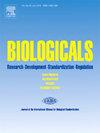Construction and evaluation of a novel Stx2a-based immunotoxin against epidermal growth factor receptor (EGFR)
IF 1.5
4区 生物学
Q4 BIOCHEMICAL RESEARCH METHODS
引用次数: 0
Abstract
Immunotoxins (ITs) are chimeric proteins that combine the targeting specificity of a monoclonal antibody or antibody fragment with the cytotoxic properties of a toxin. They offer a promising strategy for cancer therapy by selectively delivering cytotoxic payloads to tumor cells. The epidermal growth factor receptor (EGFR) is frequently overexpressed in various cancers, making it an attractive target for IT-based therapies.
In this study, we designed and constructed a novel IT composed of a single-chain variable fragment (scFv) derived from Panitumumab, a humanized monoclonal antibody targeting EGFR, and the Shiga toxin A subunit 2 (Stx2a), a potent cytotoxic agent. The IT was designed using computational tools to optimize the linker region between the scFv and Stx2a domains. The recombinant IT was expressed in a prokaryotic host and purified to homogeneity.
The cytotoxic activity of the IT was evaluated in vitro against human colorectal carcinoma (HCT-116) and human embryonic kidney (HEK293) cells. The IT demonstrated significant cytotoxicity against HCT-116 cells, while exhibiting minimal toxicity to non-target cells. To enhance the delivery and efficacy of the IT, we encapsulated it in chitosan nanoparticles. The nanoparticle-based formulation showed improved cellular uptake and enhanced cytotoxicity compared to the free IT.
Our findings suggest that the designed IT has the potential to be a promising therapeutic agent against EGFR-expressing cancers. Further studies are warranted to evaluate its efficacy in vivo and to optimize its formulation for clinical applications.
基于stx2的抗表皮生长因子受体(EGFR)免疫毒素的构建与评价
免疫毒素(ITs)是将单克隆抗体或抗体片段的靶向特异性与毒素的细胞毒性结合起来的嵌合蛋白。它们通过选择性地向肿瘤细胞传递细胞毒性有效载荷,为癌症治疗提供了一种很有前途的策略。表皮生长因子受体(EGFR)在各种癌症中经常过度表达,使其成为基于it的治疗的一个有吸引力的靶点。在这项研究中,我们设计并构建了一种新的IT,该IT由单链可变片段(scFv)和志贺毒素a亚基2 (Stx2a)组成,该片段来源于一种靶向EGFR的人源化单克隆抗体Panitumumab和一种强效细胞毒性药物。利用计算工具优化scFv和Stx2a结构域之间的连接区域。重组的IT在原核宿主中表达并纯化至均匀性。体外对人大肠癌(HCT-116)和人胚胎肾(HEK293)细胞的细胞毒活性进行了评价。它对HCT-116细胞具有显著的细胞毒性,而对非靶细胞的毒性很小。为了提高IT的递送和功效,我们将其包裹在壳聚糖纳米颗粒中。与游离的IT相比,纳米颗粒为基础的配方显示出更好的细胞摄取和增强的细胞毒性。我们的研究结果表明,设计的IT有可能成为一种有前途的治疗egfr表达癌症的药物。需要进一步的研究来评估其体内的疗效,并优化其临床应用的配方。
本文章由计算机程序翻译,如有差异,请以英文原文为准。
求助全文
约1分钟内获得全文
求助全文
来源期刊

Biologicals
生物-生化研究方法
CiteScore
3.70
自引率
0.00%
发文量
39
审稿时长
48 days
期刊介绍:
Biologicals provides a modern and multidisciplinary international forum for news, debate, and original research on all aspects of biologicals used in human and veterinary medicine. The journal publishes original papers, reviews, and letters relevant to the development, production, quality control, and standardization of biological derived from both novel and established biotechnologies. Special issues are produced to reflect topics of particular international interest and concern.Three types of papers are welcome: original research reports, short papers, and review articles. The journal will also publish comments and letters to the editor, book reviews, meeting reports and information on regulatory issues.
 求助内容:
求助内容: 应助结果提醒方式:
应助结果提醒方式:


